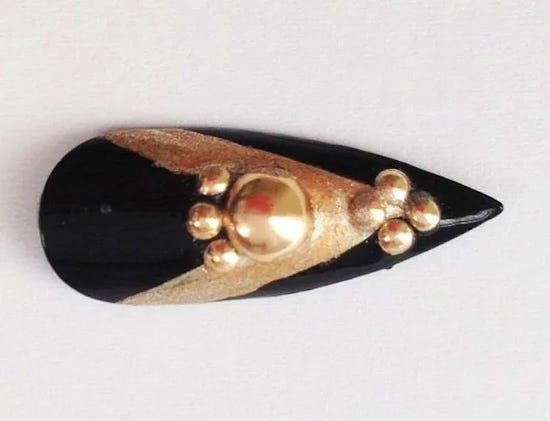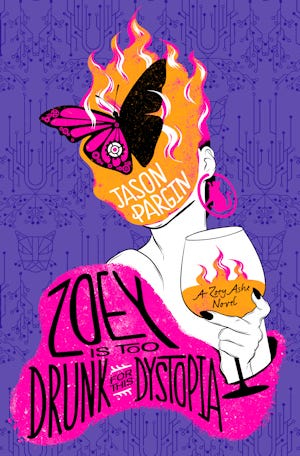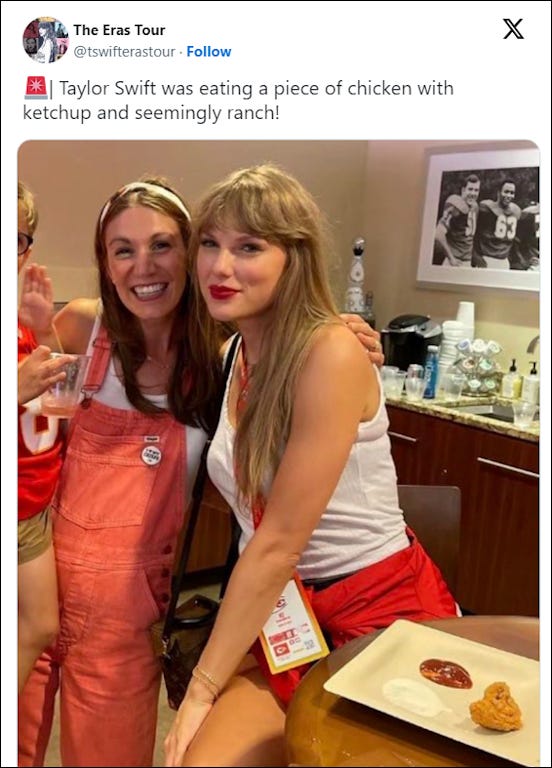Celebrity Worship is Weird and Will Only Get Weirder
Also, limited time offer on signed copies of my new book! This is not ironic!
Do you know what this is?
That, kids, is the thousand-year-old mummified right hand of St. Stephen, preserved and displayed for worshippers. This kind of thing isn’t uncommon, as it has long been believed that the severed limbs of the saints are sacred. “Damn,” you say, “religion sure makes people do weird things!” Okay, well, do you know what this is:
That’s one of Lady Gaga’s fake fingernails, it fell off during a concert and sold for $12,000 at auction. It was presumably purchased by someone who does not believe Lady Gaga is a saint and may not believe in the supernatural at all, yet they valued her discarded nail the same as a used car. There is an entire market for locks of celebrity hair and, somewhere, a Red Sox fan is about to blow his entire paycheck on a signed glove once worn by Manny Ramirez.
This all feels like the same phenomenon to me and I think it’s now driving much of our economy.
Before we dig into how weird this is, yes, I am offering signed copies of my upcoming book, which for the next couple of weeks you can order here at no additional cost, they’ll ship anywhere and you’ll be supporting a cool indie bookstore.
(NOTE: I cannot emphasize enough that signed copies are PRE-ORDER ONLY so if you’re reading this after October 30, 2023, you missed it. If you want a regular unsigned copy, order Zoey is Too Drunk for This Dystopia at Amazon (including audio), B&N or Bookshop).
1. We clearly believe celebrities are literal mystical beings
“Celebrity worship is the new religion” is an old and boring take, in that it’s clearly true but too unoriginal to enjoy thinking about. So here’s a slightly spicier version: organized religion was always just celebrity worship. Regardless of whether or not a deity exists, at ground level the mythology usually serves to declare certain flesh-and-blood humans to be magic.
But at least the religious can articulate exactly what they expect from a holy artifact, that it will bring them good fortune, ward off evil, or serve as a reminder of their religious duties. The person who paid $400,000 for the chair JK Rowling sat in when she wrote Harry Potter cannot articulate any tangible benefit beyond the fact that they may one day be able to sell it for more.
So there is quantifiable value in celebrity artifacts in the sense that we’ll fork over serious cash for them, but that value is nebulous, usually unspoken and bizarre in the details. One experiment found that subjects offered to pay less for a celebrity-owned item if it had been thoroughly washed and sterilized, as if celebrity magic is transmitted via bacteria. To understand what’s happening here, maybe we need to back up and ask…
2. Why are celebrities even a thing?
In a sane world, an unusually talented person would be admired and maybe that admiration would rise to the level of awe, if their exploits seemed truly impossible to the average person. But a “celebrity” in our culture is literally regarded as something other than a human, to the point that when we spot them eating food we react like we’ve just seen an alligator riding a motorcycle.
As for how this clearly-irrational-but-universal belief came to be, here’s the current theory as I understand it:
* Humans’ primary strength has always been in our ability to adapt, which is why we can thrive in any biome, including outer goddamned space.
* The way tribes of early humans learned to adapt was by watching and imitating whatever member of the group did it best. But because they didn’t have the scientific method, they would just imitate the whole package: if a particular fisherman was wildly successful, the others would mimic not just his tools and technique, but his shoes, his hat, the little song he sang while cleaning his fish gun.
* As religious belief evolved, good fortune in all tasks was credited to the gods. So if this fisherman was literally blessed with fish attraction powers, who’s to say how those powers might be transferred to another? If invisible forces could spread “curses” such as sickness, couldn’t the elite fisherman’s good fish fortune spread in the same way? Any connection to the man or his belongings is a possible vector.
* Because humans are tribal, loyalty to a prestigious figure would often be a rallying point for a nation/religion/subculture. Any connection to that figure (like, say, owning one of their old possessions) would raise a member’s status within that tribe.
* Fast forward tens of thousands of years and a teenage girl can become the envy of her friends merely by owning one of Taylor Swift’s discarded sauce packets.
3. Not that there’s anything wrong with that
The risk of describing the evolutionary origins of any behavior is that it can make you sound like a smug piece of shit. “Your hobbies are just silly superstitions handed down by uneducated ancestors!” But what I described at the top is “just” a silly superstition in the same way that romantic love is “just” an elaborate facade for our primal mating instincts. Anything that makes people happy can be reduced down to a remnant of some ancient survival adaptation if you’re a big enough asshole.
So instead, let me phrase it like this:
Sometimes we can love a thing or person so much that we don’t know what to do with ourselves. It’s too much, we don’t know how to express it, or even feel it. So, the love bursts out of us in ways that are irrational to outsiders. We greet our idols with screams and tears, we latch onto any piece of them we can grab, just to have something tangible to absorb some of our love.
It is all very fine and reasonable and if my signature brings some longtime reader a little bit of extra happiness then that’s fucking incredible. You’re talking about a guy who makes a new friend about once every other decade. I subtract happiness from every room I’m in. My dog doesn’t even like me that much. I’m fortunate beyond words that people want anything to do with me. But…
4. Celebrity is becoming a requirement for some jobs and most sane people aren’t built for it
I only get recognized in public like once a year, but that is already a few levels above the most famous I ever wanted to be. I know some of you don’t believe me, but note that I intentionally kept myself anonymous for the first several years I wrote online. I wanted my work to get famous, not me. I did not want the burden of being perceived and scrutinized on a personal level.
That is no longer an option. I’m a full-time author and in this media environment, the only way to reliably sell books is to become some form of celebrity. I don’t mean this as cynical commentary, it’s just the mechanics of the system. Have you wondered why online recipes always open with three paragraphs of rambling narrative about the chef’s childhood? They do it because it’s the only way to attach that list of ingredients to that particular creator, otherwise they’ll get drowned out by bots that can spam cornbread recipes at a rate of a billion per second. Well, it’s the same for an author; when content is infinite, only personality stands out.
This is what I didn’t understand when I worked at Cracked, and it’s part of what doomed us. Our feature articles had tiny bylines and most writers weren’t allowed to express themselves in first-person—they wrote in the voice of the publication, as the brand. I thought quality and a specific tone would make us stand out, but that’s not how it works. Giant content mills were able to bury us under close-enough listicles and crowd us out of search results.
Instead, we should have focused on turning our creators into a roster of celebrities. “You can get a pop culture listicle anywhere, but you can only get these specific knuckleheads at Cracked.”
This is why “influencers” are only getting richer; in an infinite ocean of content, the audience always falls back on the human connection, the mystique of celebrity. Lots of people—and bots—are making videos, but there is only one MrBeast.
Which means…
5. I must become an influencer or abandon my writer dream forever
I want to make it clear, I am not complaining. No one owes me a living as an entertainer. But here’s what this job looks like in 2023:
* Because I’m not a superstar and my novels arrive a year or two apart, there is no reliable process by which even loyal readers can know when one is coming. It’s not like subscribing to a YouTube channel or a podcast, where a feed automatically delivers content every week.
* This means the only way to make myself visible to potential readers is to create that very thing: a popular, continuously-updating feed. But that feed cannot simply be ads for my books; no platform will promote such posts even to the followers who specifically ask for them. Those frequent posts must therefore be compelling for some unrelated reason.
* Because half of my audience are not text readers (they, like me, prefer audio), a text-only feed such as this Substack is not sufficient. They want podcasts and videos.
* Therefore, I literally cannot write novels as a full time job unless I turn myself into a multimedia influencer that posts daily to a large, loyal, highly-engaged audience.
So, as of this writing, I have over 325,000 followers on TikTok (I’ve basically made that my day day job over the last year), another 54,000 on Twitter/X and the rest are scattered across my Instagram, Facebook, Threads, Facebook, Bluesky, Facebook, YouTube, Goodreads, my mailing list, this Substack and the half-dozen podcasts I guest on like The Dogg Zzone, Secretly Incredibly Fascinating and Gamefully Unemployed.
In the course of promoting this upcoming book, I will appear on at least twenty episodes of other people’s podcasts and will be interviewed by some print publications. In those appearances, I won’t be selling the new novel’s premise or characters—those things are a dime a dozen, AI can generate them in a microsecond. I’ll instead be selling its author as an Amazing Guy Whose Ideas Are Fascinating And Whose Fandom You Want To Be A Part Of. The system is telling me that I have to make it so that my name on the cover has the same hypnotic effect as an Apple logo. I find this all utterly surreal.
I love you all, it is an incredible privilege to get to write for you. Also, getting recognized in public makes me want to never leave the house and I know with 100% certainty that the only way I’ll get to continue to do this job is if I make myself famous enough that it happens frequently. The rest of my writing career doesn’t rest in my ability to generate story ideas or execute them—plenty of incredible novels sell fewer than a hundred lifetime copies—but in doing that extremely well and also making my personality and lifestyle interesting to the masses. I must become something other than a person, a symbol that can act as a receptacle for strangers’ excess emotions, including their random, ravenous hatred.
I must relentlessly climb to a level where one day people will be surprised to find that I dip chicken in ranch dressing and will pay huge money for my old furniture. This will be a bizarro world in which publications will scour the landscape for the chance to attach my name to a scandal and there’ll be an 80% chance that scandal will sell more books. If I fail at gaining and maintaining some level of personal fame, no matter how good my stories are, the average reader simply won’t know about them. It is what it is and if I don’t like it, damn it, I can go out and get a real job.
Get your signed copies here at no additional cost, they’ll ship anywhere and you’ll be supporting a cool indie bookstore. Last time I signed 2,000 of them and the stacks of them filled a huge room and it was super cool and also the sight of them almost gave me a panic attack! Everything is fine! Thanks! I love you.
(AGAIN: Signed copies are PRE-ORDER ONLY and YOU ONLY HAVE A COUPLE OF WEEKS LEFT TO DO THIS, if you’re reading this after October 30, 2023, you missed it. If you want a regular unsigned copy of my book or in some other format, order Zoey is Too Drunk for This Dystopia at Amazon (including audio), B&N or Bookshop).










